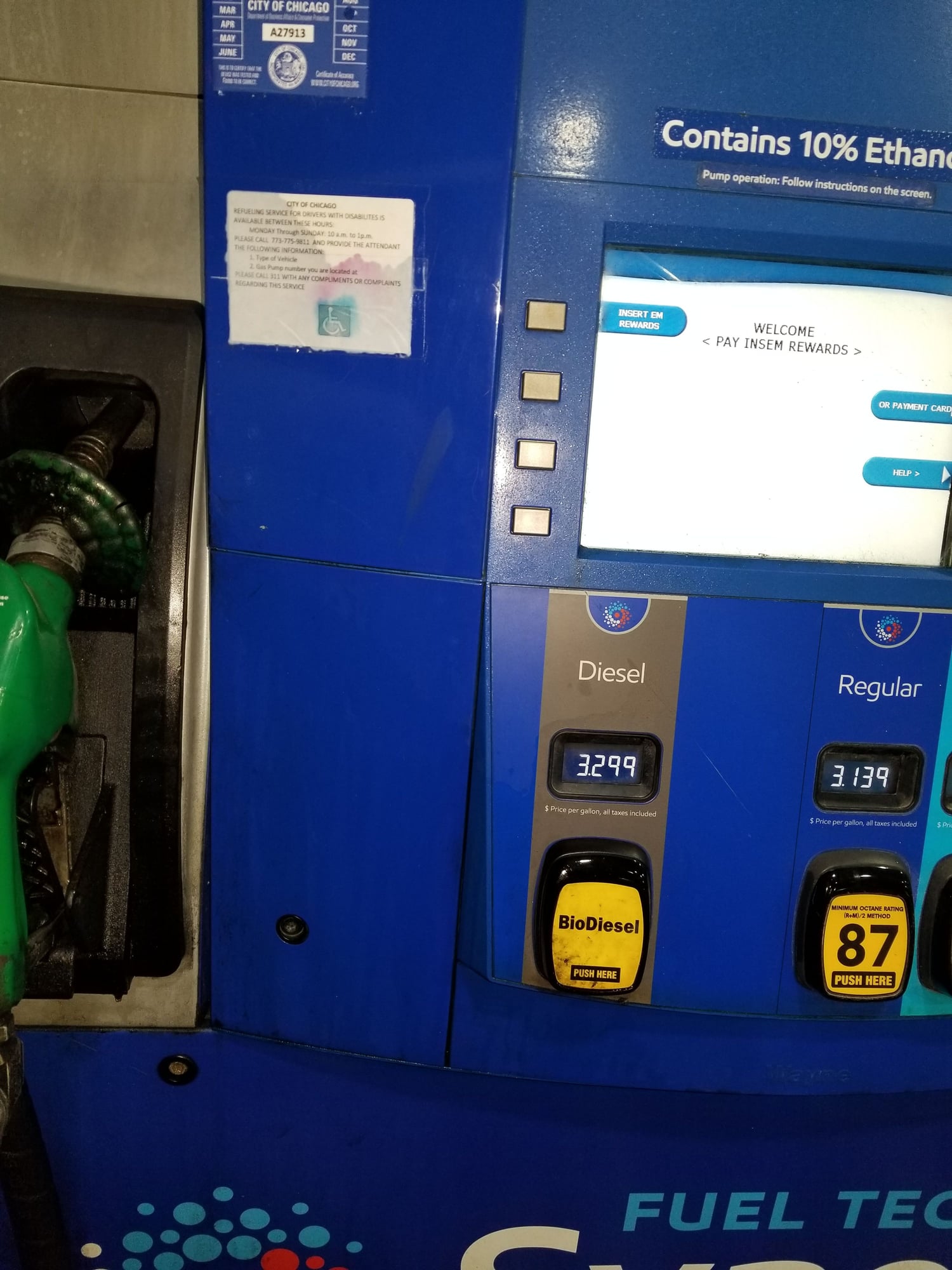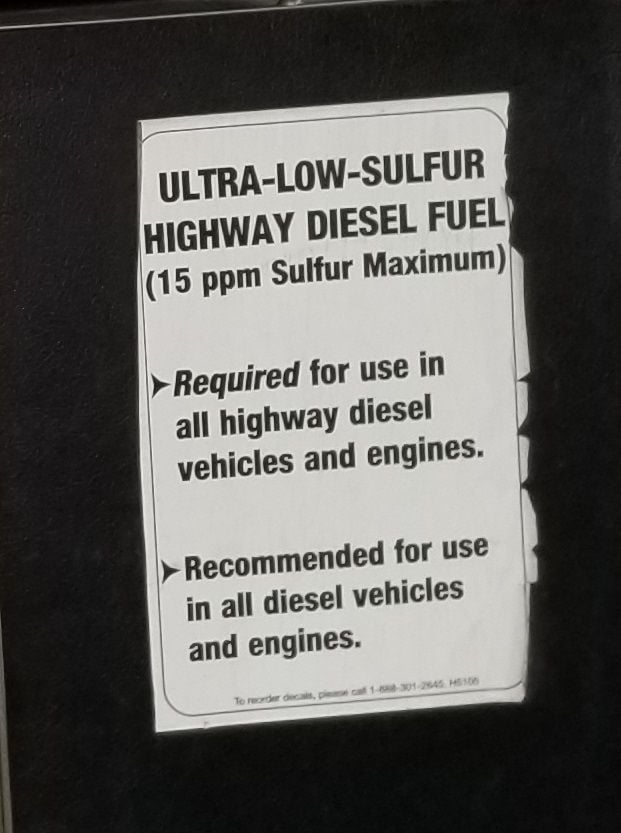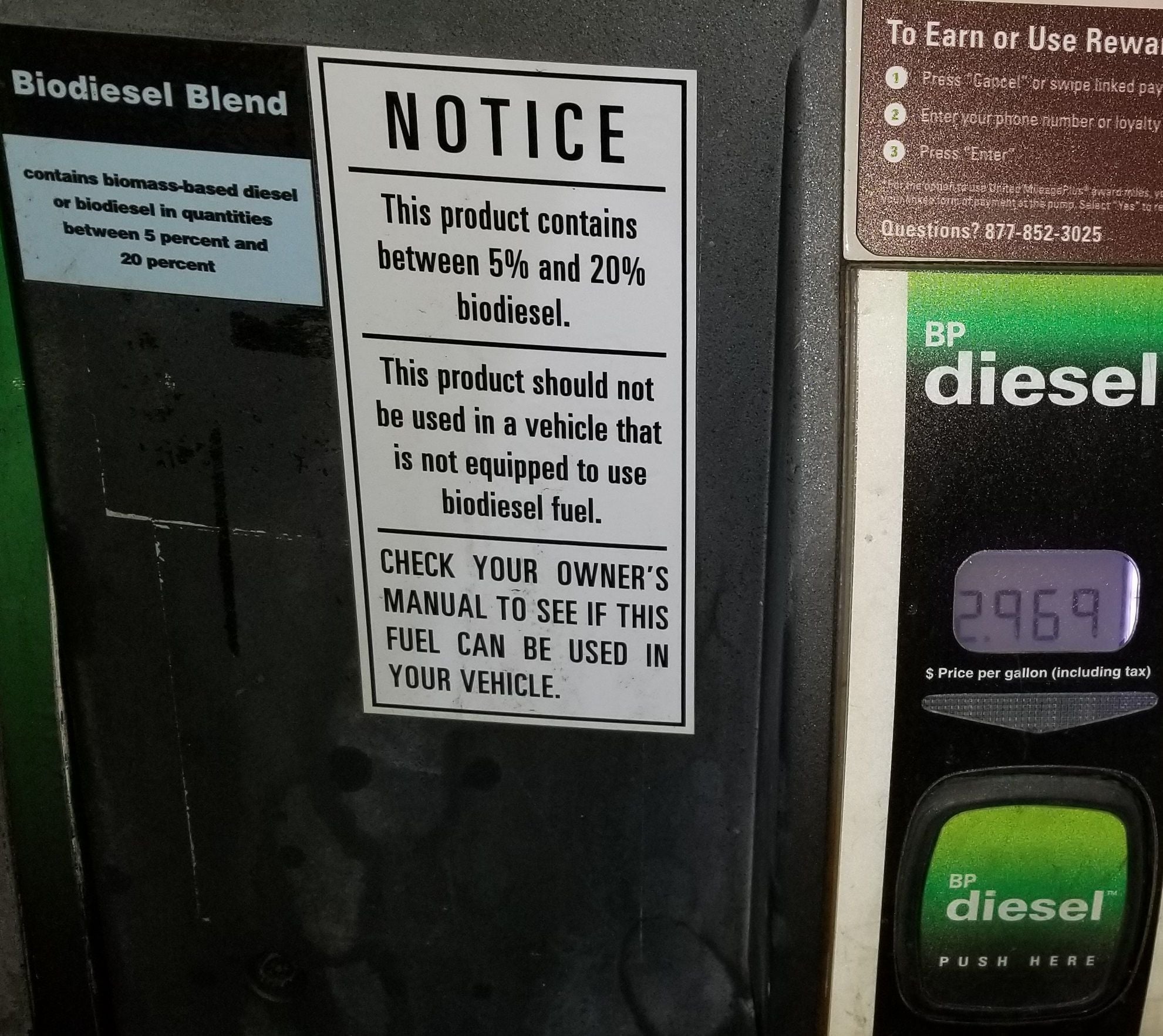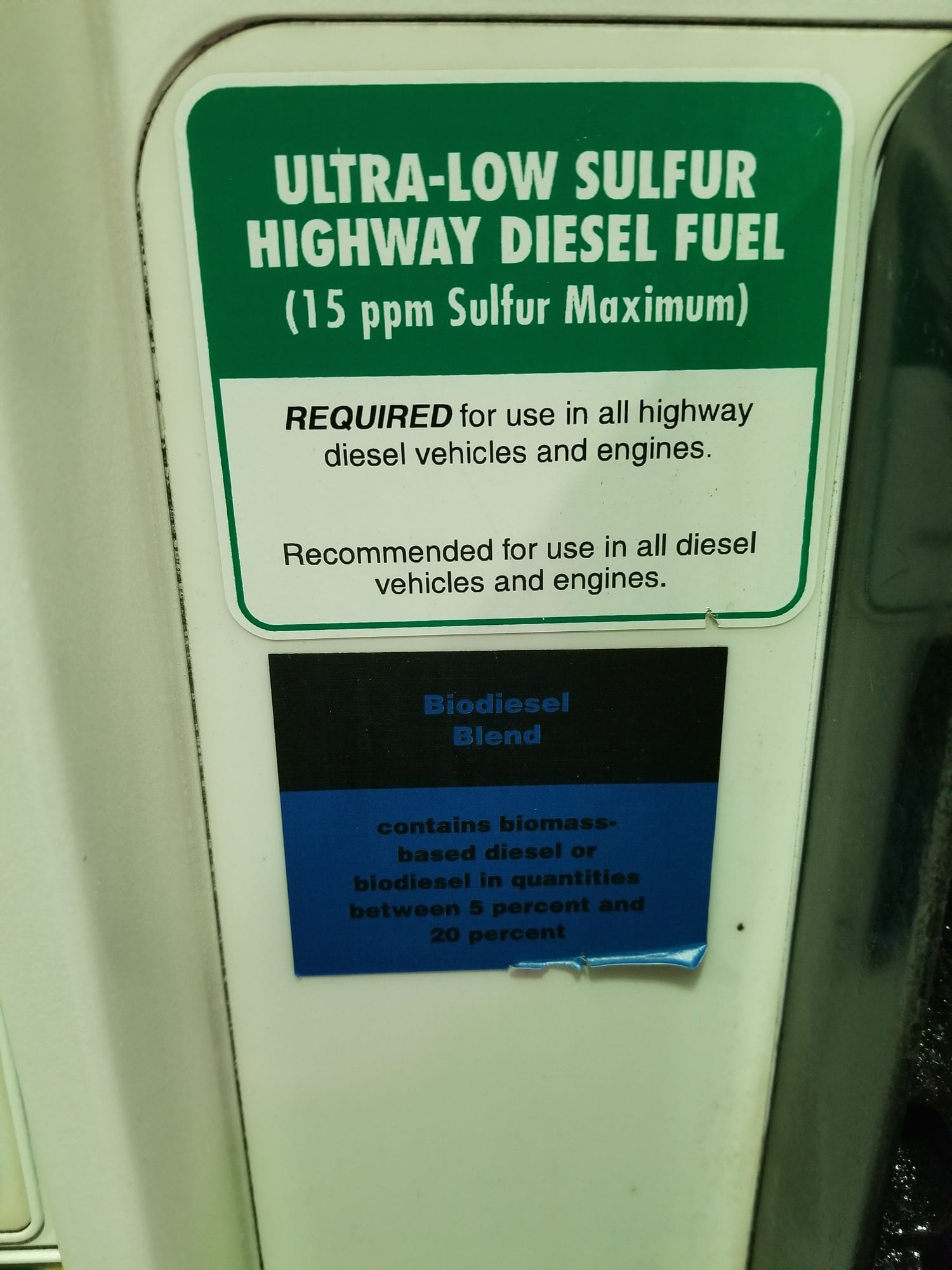Biodiesel Concerns
#1
I may be late, but I just noticed that the large containers of used cooking oil that are in the back of restaurants are used to make biodiesel gas.
https://www.popularmechanics.com/car...a6326/4311498/
Now that winter is here, it seems that the biodiesel will thicken up. In the NorthWest of Chicago, I find only Mobil gas station and it says biodiesel but no other information such as percentage.
Let me know what you think of this article and where you get you pure diesel. Thanks/
https://www.popularmechanics.com/car...a6326/4311498/
Now that winter is here, it seems that the biodiesel will thicken up. In the NorthWest of Chicago, I find only Mobil gas station and it says biodiesel but no other information such as percentage.
Let me know what you think of this article and where you get you pure diesel. Thanks/
#2
Shell and Meijer both sell ULS diesel that is B5.
Mobil says theirs is between B5 and B20, not recommended by Porsche. I actually had the selling dealer put in half a tank when I bought mine and I freaked out after I read the owner's manual. I called a couple Porsche dealers and spoke to the SA and they both said although not recommended, it's acceptable but I had to monitor my oil level. Then some research indicated that VW TDI and Audi owners received letters saying that up to B20 may be used; see below.
What is biodiesel?
Biodiesel is a domestically produced, clean-burning and renewable partial substitute for conventional (petroleum) diesel fuel. Why is it important for me to know about biodiesel fuel blends? Your vehicle was originally designed to run on “ULSD” - Ultra Low Sulfur Diesel No. 2 – fuel that complies with ASTM D-975 specifications and permits up to a maximum blend of 5% biodiesel (B5). Due to Illinois state tax incentives for biofuels, biodiesel blends of B5 or less may not be available in Illinois. However, we want to assure you that Audi will continue to honor the terms and conditions of the Audi Limited Warranties that came with your vehicle. Biodiesel blends (up to B20) may be used in your Illinois-registered TDI« Clean Diesel vehicle; however please be aware that biodiesel has characteristics that are different from other kinds of fuel, especially petroleum-based fuels.
How does biodiesel differ from ULSD diesel fuel?
Biodiesel can attract water and also deteriorate with age. Small amounts of biodiesel can get into the engine oil, but unlike petroleum diesel, it does not evaporate over time. This can cause the oil level in the engine to rise and can affect the quality of the oil. Audi of America, Inc. Audi of America, Inc. 3800 Hamlin Rd. Auburn Hills, MI 48326 www.audiusa.com
When I use biodiesel blends in my Illinois registered Audi TDI« Clean Diesel vehicle, what should I remember?
Routinely check the engine oil level. A good time to do this is when you refuel, especially if you regularly do a lot of short distance or stop-and-go driving. This will help you see if the engine oil level is getting higher. (A rising oil level beyond the maximum indicator means an oil change is needed due to the dilution of the oil in the system; a potential characteristic of biodiesel use.) See your Owner’s Manual for additional information on checking the engine oil level in your vehicle
I personally went and had my oil changed, drove all the biodiesel out and put in ULSD and I will never put in Mobil again.
Mobil says theirs is between B5 and B20, not recommended by Porsche. I actually had the selling dealer put in half a tank when I bought mine and I freaked out after I read the owner's manual. I called a couple Porsche dealers and spoke to the SA and they both said although not recommended, it's acceptable but I had to monitor my oil level. Then some research indicated that VW TDI and Audi owners received letters saying that up to B20 may be used; see below.
What is biodiesel?
Biodiesel is a domestically produced, clean-burning and renewable partial substitute for conventional (petroleum) diesel fuel. Why is it important for me to know about biodiesel fuel blends? Your vehicle was originally designed to run on “ULSD” - Ultra Low Sulfur Diesel No. 2 – fuel that complies with ASTM D-975 specifications and permits up to a maximum blend of 5% biodiesel (B5). Due to Illinois state tax incentives for biofuels, biodiesel blends of B5 or less may not be available in Illinois. However, we want to assure you that Audi will continue to honor the terms and conditions of the Audi Limited Warranties that came with your vehicle. Biodiesel blends (up to B20) may be used in your Illinois-registered TDI« Clean Diesel vehicle; however please be aware that biodiesel has characteristics that are different from other kinds of fuel, especially petroleum-based fuels.
How does biodiesel differ from ULSD diesel fuel?
Biodiesel can attract water and also deteriorate with age. Small amounts of biodiesel can get into the engine oil, but unlike petroleum diesel, it does not evaporate over time. This can cause the oil level in the engine to rise and can affect the quality of the oil. Audi of America, Inc. Audi of America, Inc. 3800 Hamlin Rd. Auburn Hills, MI 48326 www.audiusa.com
When I use biodiesel blends in my Illinois registered Audi TDI« Clean Diesel vehicle, what should I remember?
Routinely check the engine oil level. A good time to do this is when you refuel, especially if you regularly do a lot of short distance or stop-and-go driving. This will help you see if the engine oil level is getting higher. (A rising oil level beyond the maximum indicator means an oil change is needed due to the dilution of the oil in the system; a potential characteristic of biodiesel use.) See your Owner’s Manual for additional information on checking the engine oil level in your vehicle
I personally went and had my oil changed, drove all the biodiesel out and put in ULSD and I will never put in Mobil again.
#3
Rennlist Member
I may be late, but I just noticed that the large containers of used cooking oil that are in the back of restaurants are used to make biodiesel gas.
https://www.popularmechanics.com/car...a6326/4311498/
Now that winter is here, it seems that the biodiesel will thicken up. In the NorthWest of Chicago, I find only Mobil gas station and it says biodiesel but no other information such as percentage.
Let me know what you think of this article and where you get you pure diesel. Thanks/
https://www.popularmechanics.com/car...a6326/4311498/
Now that winter is here, it seems that the biodiesel will thicken up. In the NorthWest of Chicago, I find only Mobil gas station and it says biodiesel but no other information such as percentage.
Let me know what you think of this article and where you get you pure diesel. Thanks/
Not sure where you are, but in many places, you can't get biodiesel. In others, finding pure diesel is hard. But if it's bio, it's got to be labled somewhere on the pump.
And as for thickening, the winterizing additives will give it the same gell point as regular diesel, so you shouldn't have any worries about that.
#4
Instructor
The main concern for biodiesel is fuel dilution in the oil. As long as you have your factory emissions system, the DPF will require occasional regeneration via injecting fuel in the exhaust stroke. This fuel combusts in the exhaust and is controlled to heat up the DPF and cause the soot to burn. Since you are injecting a significant amount of fuel into the cylinder and not igniting it, a relatively large proportion of it clings to the cylinder walls and makes its way to the crankcase. The boiling point of biodiesel is higher than regular #2 diesel, so less of it volatilizes and gets sucked into the intake via the breather system. Over time this reduces the viscosity of the oil and can lead to engine wear issues (mainly excessive valvetrain wear).
There are also other issues related to production quality and transport/storage.
Biodiesel is more hydroscopic than regular #2 diesel. In the same conditions biodiesel absorbs many times more water than petroleum diesel. The water has low lubricity, so it can increase wear on the high pressure pump and other fuel system components, since they are lubricated with diesel fuel. Once it gets into the crankcase it will also lower the viscosity of the oil and in significant enough quantities can lead to oil freezing at low temps, which obviously leads to bad things on startup. This is really only a concern if you never let the engine oil reach operating temps (I.e. you drive it 5 minutes/day in the city all winter).
There is also the issue of bacteria/fungi growth is more susceptible in biodiesel. The microbes create a black sludge in the tank, which can clog filters. This can easily be mitigated with regular use of any quality diesel additive.
There are also other issues related to production quality and transport/storage.
Biodiesel is more hydroscopic than regular #2 diesel. In the same conditions biodiesel absorbs many times more water than petroleum diesel. The water has low lubricity, so it can increase wear on the high pressure pump and other fuel system components, since they are lubricated with diesel fuel. Once it gets into the crankcase it will also lower the viscosity of the oil and in significant enough quantities can lead to oil freezing at low temps, which obviously leads to bad things on startup. This is really only a concern if you never let the engine oil reach operating temps (I.e. you drive it 5 minutes/day in the city all winter).
There is also the issue of bacteria/fungi growth is more susceptible in biodiesel. The microbes create a black sludge in the tank, which can clog filters. This can easily be mitigated with regular use of any quality diesel additive.
The following users liked this post:
FutureAaron (03-21-2022)
#6
So I uploaded the stickers on the three gas stations. I couldn't find a Shell with diesel.
Avoid Mobil!!!!!! No stickers anywhere. BP is terrible. Up to 20%??? I put in Marathon diesel but not 100% sure on that.
Avoid Mobil!!!!!! No stickers anywhere. BP is terrible. Up to 20%??? I put in Marathon diesel but not 100% sure on that.
#7
Rennlist Member
Check the state rules which are all different. In MN they sell up to 20% bio in the summer and 5% during winter months. The bio is mostly soybean. VW sent owners a letter exempting them from the 5% bio warranty limit when mn raises the biodiesel limits. Farm state so farmers have a large lobby. I didn't have any issues with the Touareg as long as I stayed with major brands. The station owners were allowed to have labels that state 5% to 20%.





